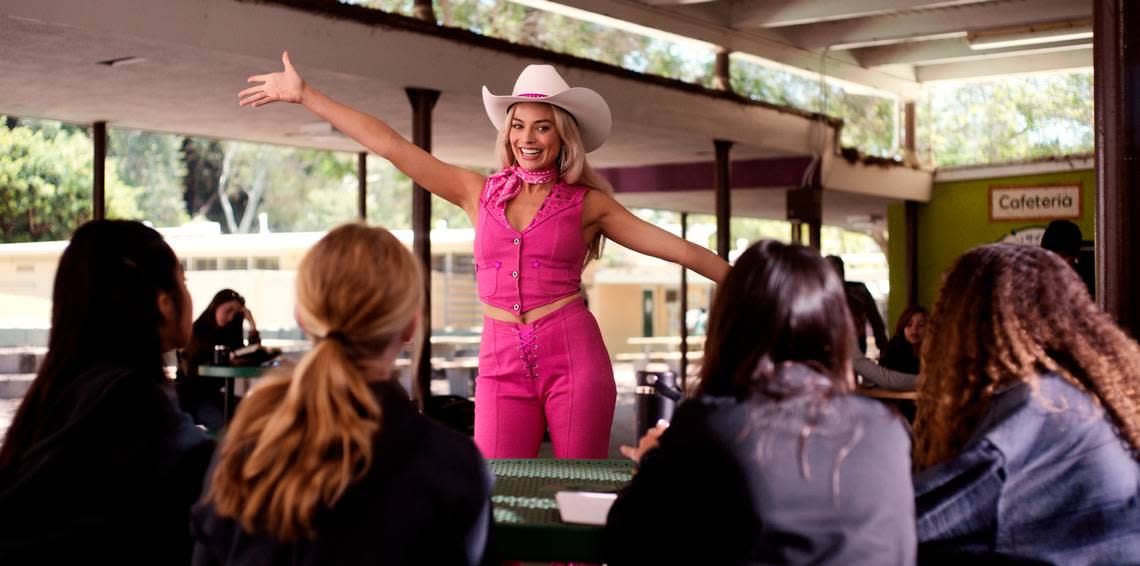Ignore the pearl-clutching conservatives. ‘Barbie’ is not anti-men | Opinion

It was only a matter of time before Greta Gerwig’s “Barbie” became a right-wing target, given its mainstream popularity and message of female empowerment.
In fact, the culture warriors pounced immediately.
The day “Barbie” premiered, right-wing commentator Ben Shapiro proclaimed that the “flaming garbage heap of a film” was one of the most woke movies he had ever seen. In a 42-minute rant posted to YouTube the next day, Shapiro threw a pair of Barbie and Ken dolls into a trash can and lit them on fire.
Others have labeled it “man-hating feminist propaganda,” a “two hour woke-a-thon brimming with feminist lectures and nuclear-level rage against men” and a “deeply anti-man movie in which every male character is either an idiot, bigot or loser.”
Please.
Sure, “Barbie” contains its fair share of social commentary. Beneath the flamingo-pink fantasia is a clever indictment of patriarchal society and the ways in which it perpetuates toxic masculinity and gender norms. But anyone who leaves the theater thinking that “Barbie” is anti-man either didn’t pay enough attention or deliberately misunderstood the point.
The true villain of “Barbie” isn’t men — it’s the patriarchy. And no, it’s not the same thing.
Just look at Ken (Ryan Gosling). In Barbieland, gender roles are reversed: women rule everything and men are left to fill the jobs of boyfriend and “beach.” Despite being conventionally attractive and polite, Ken still can’t manage to win Barbie’s affection, and he struggles to find a sense of identity that isn’t defined by his relationship to Barbie.
Ken’s ego is fragile, and there’s only so much he can take. He grows tired of being treated as an accessory, so he’s excited when he visits the Real World and discovers the patriarchy. Ultimately, he and the other Kens in Barbieland into caricatures of toxic masculinity, complete with mansplaining of “The Godfather” and guitar serenades.
But the patriarchy ultimately isn’t the answer to Ken’s problems. Being an ultra-manly man doesn’t make Barbie love him, and it doesn’t solve his identity crisis. Ken admits to Barbie he was playing a role that the patriarchy made him feel like he had to play because he was afraid to admit to Barbie how he really felt. Barbie apologizes for taking Ken for granted and encourages him to embrace who he really is, independent of anyone else.
As much as men benefit from the patriarchy, they can also be victims of it. Society tells men they shouldn’t cry, or that they should play with trucks instead of Barbies. Gender roles aren’t good for anyone, and they will always create a set of unrealistic expectations that chafe against reality. Toxic masculinity is born from the gap between who men are and who society tells them they are supposed to be, or between the life they have and the one they’re told they deserve.
While “Barbie” focuses heavily on the double standards associated with being a woman, its message is also that the patriarchy is bad for everyone. The Kens are not inherently bad, because toxic masculinity is not innate. It is a learned behavior, and it’s the patriarchy that ultimately corrupts them. “Barbie” encourages everyone — not just women — to shed the weight of society’s expectations and be whoever they want to be.
All of that aside, though, there’s also something to be said about conservatives’ tendency to misrepresent anything that is remotely pro-woman as anti-man. Even if Ken’s character had a different storyline, this film still wouldn’t be about hating men. Ken’s journey is not what absolves “Barbie” of misandry.
A critique of the patriarchy is hardly an attack on men as a whole, but it is a challenge to their dominance in society. It encourages women not to quietly accept their inferiority. Some men may be threatened by that, because, despite its flaws, the patriarchy is a system that has afforded them many privileges. Like everything else caught up in the culture wars, the backlash to “Barbie” is purely reactionary.


